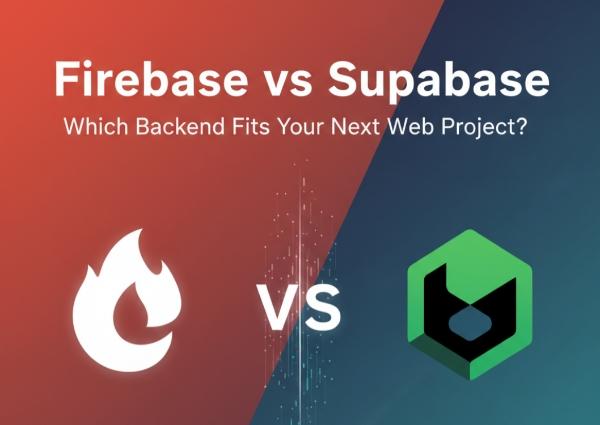Choosing the right backend can make or break your web app. Here’s an honest, developer-to-developer comparison of Firebase and Supabase; their strengths, weaknesses, and which one might be the smarter choice for your next project.

If you’ve ever built a web or mobile app, you know how crucial the backend is. It’s where your app stores data, handles authentication, and connects everything behind the scenes.
Two of the most popular options today are Firebase (by Google) and Supabase (the open-source challenger). I’ve worked with both, and while they share some similarities, they serve slightly different needs, depending on what kind of project you’re building.
Let’s break this down in plain English.
Firebase is a Backend-as-a-Service (BaaS) built by Google that lets you focus on building your app rather than setting up servers. It’s known for its Realtime Database, Cloud Firestore, and authentication system that “just works.”
In simple terms: Firebase gives you an entire backend in minutes; authentication, database, hosting, push notifications, analytics, everything is connected and ready to go.
It’s perfect for startups, solo developers, or teams who want to move fast.
Supabase, on the other hand, calls itself an “open-source alternative to Firebase.” And it really lives up to that tagline.
It’s built on top of PostgreSQL, one of the most reliable and scalable relational databases in the world. That means you get real SQL, fine-tuned control over your data, and self-hosting options, things Firebase doesn’t offer.
Supabase gives you modern tools like authentication, APIs, file storage, and real-time subscriptions, but in a way that’s open, transparent, and developer-friendly.
Firebase uses NoSQL databases like Firestore, which are document-based. This makes it super flexible, but harder to query if you’re used to traditional SQL.
Supabase, on the other hand, uses PostgreSQL, a relational database, great for structured data, complex relationships, and advanced queries.
Verdict:
If your data is hierarchical and you value flexibility, go with Firebase.
If you need complex relationships or SQL familiarity, Supabase wins.
Both offer easy-to-use authentication systems with social logins like Google, Facebook, and Apple.
Firebase has been around longer, so it’s more mature and integrates smoothly across mobile and web apps. Supabase Auth is improving fast, but still catching up in terms of ecosystem and documentation.
Verdict:
Firebase still takes the lead for seamless authentication, especially for mobile.
Firebase’s free tier is generous, but as your app scales, costs can rise quickly because pricing depends on read/write operations and bandwidth usage.
Supabase pricing is simpler and often more affordable for medium-sized apps. Plus, you can host it yourself for full cost control.
Verdict:
If you’re building something small and need speed, Firebase.
If you’re planning to scale or want transparency, Supabase.
Firebase’s real-time updates are legendary, data syncs instantly across users.
Supabase has real-time subscriptions too, powered by PostgreSQL triggers, but it’s still catching up to Firebase’s reliability and performance for large-scale real-time apps.
Verdict:
For chat apps, live dashboards, or instant updates, Firebase remains slightly ahead.
Supabase gives you SQL access, RESTful APIs, and GraphQL support, while Firebase relies more on SDKs. Supabase also integrates beautifully with tools like Next.js, Flutter, and React.
Firebase’s documentation is excellent, but some devs feel “locked in” because of how proprietary it is.
Verdict:
If you value openness and control, Supabase feels more developer-friendly.
If you value speed and polish, Firebase is unbeatable.
Let’s make it simple:
Both Firebase and Supabase are powerful in their own ways. If you want fast setup and Google’s reliability, go with Firebase. If you prefer open-source flexibility and SQL control, Supabase is your match. Choose what fits your project’s goals, both can take your web app far.
Your email address will not be published. Required fields are marked *